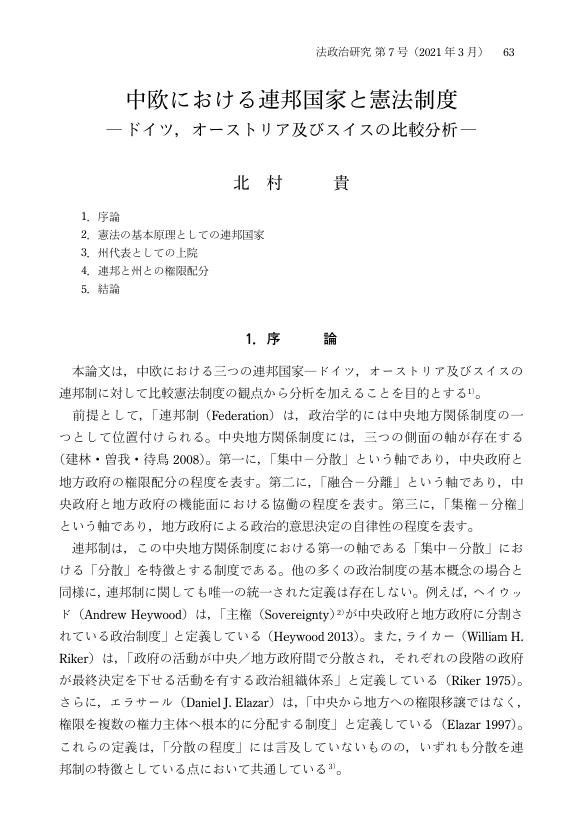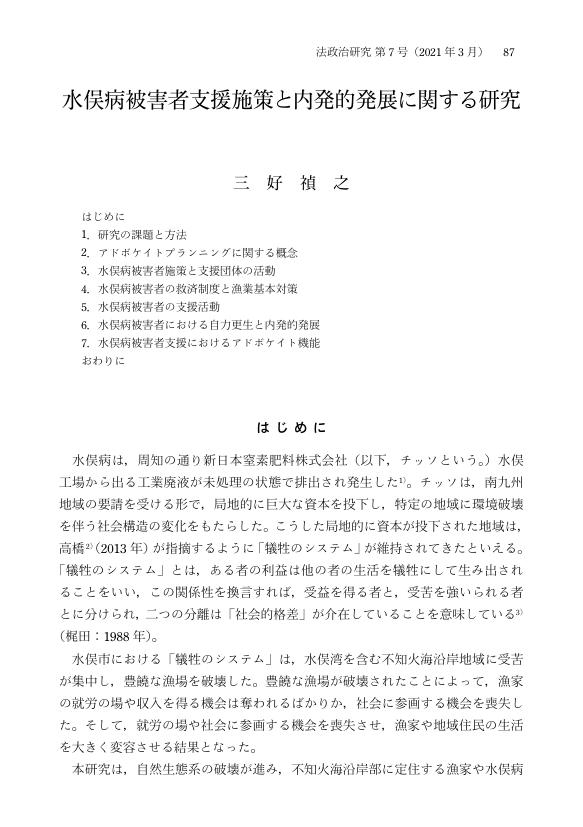- 著者
- 山﨑 将文
- 出版者
- 関西法政治研究会
- 雑誌
- 法政治研究 (ISSN:21894124)
- 巻号頁・発行日
- vol.2, pp.1, 2016 (Released:2016-12-26)
- 著者
- 北村 貴
- 出版者
- 関西法政治研究会
- 雑誌
- 法政治研究 (ISSN:21894124)
- 巻号頁・発行日
- vol.2, pp.89, 2016 (Released:2016-12-26)
- 著者
- 団上 智也
- 出版者
- 関西法政治研究会
- 雑誌
- 法政治研究 (ISSN:21894124)
- 巻号頁・発行日
- vol.4, pp.135, 2018 (Released:2018-05-28)
2 0 0 0 靖国神社公式参拝訴訟控訴審判決について
In this paper, I study three high courts decisions on the official visiting of the primeminister to the Yasukuni Shrine. I think that there are several problems in these decisions. And so I take up three points : (1) problem of standing to sue on the provision of the separation of religion and politics, (2) whether the religious personarity right is a legal right or interest, (3) what constitutional decision should be.
2 0 0 0 OA 第一次国民投票法改正 : 立法過程と改正法施行後の法制整備の動向
- 著者
- 南部 義典
- 出版者
- 関西法政治研究会
- 雑誌
- 法政治研究 (ISSN:21894124)
- 巻号頁・発行日
- vol.First, pp.145-191, 2015-03-29 (Released:2017-07-06)
The Act on the Partial Revision of National Referendum Act was enacted at the 186th ordinary session of the Diet, and was enforced on June 20, 2014. By this revision, the minimum age of voting in the referendum regarding constitutional amendment is prescribed at twenty for next four years, and the age will be at eighteen four years later. But the minimum age of voting in public elections, the age of majority in the Civil Code, and the age of application for Juvenile Act are remained at twenty, lowering promptly these ages to eighteen is recognized as an important problem at the point of view of legal uniformity. At the final stage of the 187th extraordinary session of the Diet, the Bill for the Act on the Partial Revision of the Public Offices Election Act (to lower the minimum age of voting) was submitted, but was scrapped due to dissolution of the House of Representatives. Additionally, the problems as to the regulation to organizational campaign by the public officials, expansion of the referendum subjects, methodology of political education and the others are also emerging in relation to NRA system. These remaining problems should be solved legislatively on the wide consensus of political parties, according to the initiative requirement of Article 96 of the Japanese Constitution. It is considered definitely that to solve legislative problems as to NRA on the wide consensus is politically important requirement to lead to the success to the initiative for the amendment to Japanese Constitution by the Diet in future.
2 0 0 0 OA 天皇規定に関する学界の固定観念
A number of scholars of the Japanese Constitutional Law believe that status of Japanese Emperor was demoted from the head of the Empire (combining in Himself the rights of sovereignity) to the symbol of the State and of the people after the defeat in the World War II. I disagree with this perspective. Because it is based on old formula and traditional definition of monarchy, it is an obsolate point of view. The purpose of this paper is to substantiate my disagreement with the above conception.
1 0 0 0 OA 公立小学校における児童のスカーフ着用禁止に対するオーストリア憲法裁判所の違憲判決
- 著者
- 北村 貴
- 出版者
- 関西法政治研究会
- 雑誌
- 法政治研究 (ISSN:21894124)
- 巻号頁・発行日
- vol.8, pp.43, 2022 (Released:2022-06-17)
- 著者
- 飯塚 智規
- 出版者
- 関西法政治研究会
- 雑誌
- 法政治研究 (ISSN:21894124)
- 巻号頁・発行日
- vol.8, pp.63, 2022 (Released:2022-06-17)
- 著者
- 漆畑 貴久
- 出版者
- 関西法政治研究会
- 雑誌
- 法政治研究 (ISSN:21894124)
- 巻号頁・発行日
- vol.7, pp.31, 2021 (Released:2021-06-01)
1 0 0 0 OA 中欧における連邦国家と憲法制度 ―ドイツ,オーストリア及びスイスの比較分析―
- 著者
- 北村 貴
- 出版者
- 関西法政治研究会
- 雑誌
- 法政治研究 (ISSN:21894124)
- 巻号頁・発行日
- vol.7, pp.63, 2021 (Released:2021-06-01)
1 0 0 0 OA 水俣病被害者支援施策と内発的発展に関する研究
- 著者
- 三好 禎之
- 出版者
- 関西法政治研究会
- 雑誌
- 法政治研究 (ISSN:21894124)
- 巻号頁・発行日
- vol.7, pp.87, 2021 (Released:2021-06-01)
1 0 0 0 OA 行政職員を対象とした防災研修についての研究 ―必要性・現状・内容―
- 著者
- 飯塚 智規
- 出版者
- 関西法政治研究会
- 雑誌
- 法政治研究 (ISSN:21894124)
- 巻号頁・発行日
- vol.7, pp.115, 2021 (Released:2021-06-01)
1 0 0 0 OA 漁業補助金規律における「特別かつ異なる待遇」の意義 ―ACP諸国との関係に着目して
- 著者
- 中田 達也
- 出版者
- 関西法政治研究会
- 雑誌
- 法政治研究 (ISSN:21894124)
- 巻号頁・発行日
- vol.7, pp.139, 2021 (Released:2021-06-01)
1 0 0 0 OA 東欧における「記憶法」の分析 ―「記憶法」における取り扱いとその要因―
- 著者
- 田上 雄大
- 出版者
- 関西法政治研究会
- 雑誌
- 法政治研究 (ISSN:21894124)
- 巻号頁・発行日
- vol.8, pp.1, 2022 (Released:2022-06-17)
1 0 0 0 OA アメリカ不法行為法における法令遵守と法令違反の法的効果
- 著者
- 楪 博行
- 出版者
- 関西法政治研究会
- 雑誌
- 法政治研究 (ISSN:21894124)
- 巻号頁・発行日
- vol.8, pp.19, 2022 (Released:2022-06-17)
1 0 0 0 OA 非侵襲的出生前遺伝学的検査の現況と問題
- 著者
- 林 弘正
- 出版者
- 関西法政治研究会
- 雑誌
- 法政治研究 (ISSN:21894124)
- 巻号頁・発行日
- vol.7, pp.1, 2021 (Released:2021-06-01)
1 0 0 0 OA アメリカにおける過失による不法行為の形成
- 著者
- 楪 博行
- 出版者
- 関西法政治研究会
- 雑誌
- 法政治研究 (ISSN:21894124)
- 巻号頁・発行日
- vol.6, pp.1, 2020 (Released:2020-06-01)
- 著者
- 下條 芳明
- 出版者
- 関西法政治研究会
- 雑誌
- 法政治研究 (ISSN:21894124)
- 巻号頁・発行日
- vol.6, pp.29, 2020 (Released:2020-06-01)
1 0 0 0 OA 市町村の機能的な災害対応のための体制構築に関する研究 ―意思決定・組織設計・研修―
- 著者
- 飯塚 智規
- 出版者
- 関西法政治研究会
- 雑誌
- 法政治研究 (ISSN:21894124)
- 巻号頁・発行日
- vol.6, pp.73, 2020 (Released:2020-06-01)
1 0 0 0 OA 2019年オーストリア政治に対する憲法制度的分析
- 著者
- 北村 貴
- 出版者
- 関西法政治研究会
- 雑誌
- 法政治研究 (ISSN:21894124)
- 巻号頁・発行日
- vol.6, pp.161, 2020 (Released:2020-06-01)

















